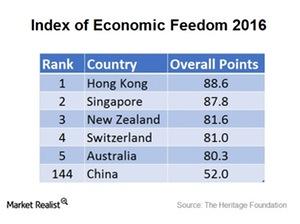What’s China’s Ranking in Index of Economic Freedom 2016?
China fell into the “mostly unfree” category, according to the Index of Economic Freedom for 2016. It was ranked 144th and scored 52.0 on the index.
Aug. 9 2016, Published 9:05 a.m. ET

The Index of Economic Freedom for 2016
The Index of Economic Freedom is the ranking of nations according to their levels of economic freedom. It was developed by the Heritage Foundation in partnership with the Wall Street Journal.
China fell into the “mostly unfree” category, according to the Index of Economic Freedom for 2016. It was ranked 144th and scored 52.0 on the index behind other developing countries such as India, Brazil, and Pakistan. Some think it strange that a superpower economy such as China falls into this category.
The main reasons China performed poorly in the Index of Economic Freedom are severe environmental problems, rampant poverty, corruption, child labor, poor human rights, and suppression of freedom of expression.
China’s economic progress and rise in annual income
China has achieved rapid industrialization and economic growth over the past two decades. It has successfully emerged as one of the most influential countries in international trade. However, such admiration has to be limited to its economic and technological progress.
According to the National Bureau of Statistics of China, China’s national per capita disposable income was 21,966 yuan (or $3,349) in 2015, a 7.4% rise from 2014 in real terms. Income in China has increased steadily over the last decade, but the gap between the rich and the poor is widening.
According to a report from Peking University, China has one of the world’s highest levels of income inequality. The richest 1% of Chinese households own a third of the country’s wealth. The poorest 25% own just 1% of the country’s total wealth.
Democracy is non-existent in China
Democracy is non-existent in China. Without the consent of the general public, a group of people form China’s communist government. China has diluted its communist philosophy to move toward a capitalist form of economy by giving freedom to businesses, but not to its citizens.
China’s communist philosophy includes state ownership of enterprises and the prevention of a concentration of wealth by individuals. It calls for equal distribution of national income to all people. Today, large private sector projects operate in China based on profit motive, which is contrary to communist doctrine.
In the next part of the series, we’ll see how China suppresses freedom of expression.
